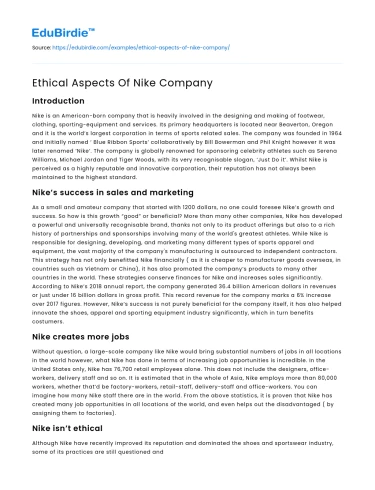Introduction
Nike is an American-born company that is heavily involved in the designing and making of footwear, clothing, sporting-equipment and services. Its primary headquarters is located near Beaverton, Oregon and it is the world’s largest corporation in terms of sports related sales. The company was founded in 1964 and initially named ‘ Blue Ribbon Sports’ collaboratively by Bill Bowerman and Phil Knight however it was later renamed ‘Nike’. The company is globally renowned for sponsoring celebrity athletes such as Serena Williams, Michael Jordan and Tiger Woods, with its very recognisable slogan, ‘Just Do it’. Whilst Nike is perceived as a highly reputable and innovative corporation, their reputation has not always been maintained to the highest standard.
Nike’s success in sales and marketing
As a small and amateur company that started with 1200 dollars, no one could foresee Nike’s growth and success. So how is this growth “good” or beneficial? More than many other companies, Nike has developed a powerful and universally recognisable brand, thanks not only to its product offerings but also to a rich history of partnerships and sponsorships involving many of the world's greatest athletes. While Nike is responsible for designing, developing, and marketing many different types of sports apparel and equipment, the vast majority of the company's manufacturing is outsourced to independent contractors. This strategy has not only benefitted Nike financially ( as it is cheaper to manufacturer goods overseas, in countries such as Vietnam or China), it has also promoted the company’s products to many other countries in the world. These strategies conserve finances for Nike and increases sales significantly. According to Nike’s 2018 annual report, the company generated 36.4 billion American dollars in revenues or just under 16 billion dollars in gross profit. This record revenue for the company marks a 6% increase over 2017 figures. However, Nike’s success is not purely beneficial for the company itself, it has also helped innovate the shoes, apparel and sporting equipment industry significantly, which in turn benefits costumers.
Save your time!
We can take care of your essay
- Proper editing and formatting
- Free revision, title page, and bibliography
- Flexible prices and money-back guarantee
Nike creates more jobs
Without question, a large-scale company like Nike would bring substantial numbers of jobs in all locations in the world however, what Nike has done in terms of increasing job opportunities is incredible. In the United States only, Nike has 76,700 retail employees alone. This does not include the designers, office-workers, delivery staff and so on. It is estimated that in the whole of Asia, Nike employs more than 80,000 workers, whether that’d be factory-workers, retail-staff, delivery-staff and office-workers. You can imagine how many Nike staff there are in the world. From the above statistics, it is proven that Nike has created many job opportunities in all locations of the world, and even helps out the disadvantaged ( by assigning them to factories).
Nike isn’t ethical
Although Nike have recently improved its reputation and dominated the shoes and sportswear industry, some of its practices are still questioned and completely not transparent. ‘The International Labour Rights Forum’ has stated that Nike has ‘turned its back on its commitment to the Worker Rights Consortium ( WRC)’, which effectively blocks labour rights experts from independently monitoring Nike’s supplier factories.’ ( Quoted from TILRF Website) Nike only managed to score 36 out of 100 in the ‘Fashion Revolution’s 2017 Fashion Transparency Index’, showing that the company is nowhere close to being transparent with its consumers. However, recently, Nike has made some positive alterations to its environmental practices by using sustainable and recyclable materials, including organic and recycled cotton and polyester whilst cutting down on water wastage. It has also made a public commitment and statement to decrease its carbon emissions by over 50% by 2025. Nike has joined ‘The Sustainable Apparel Coalition’, however, the corporation has not done much in terms of making their factory conditions healthier for their workers, which creates an immense problem for workers who are exposed to them and for those who choose to purchase Nike products. Greenspace, a credible organisation that deals with environmental issues, have voiced their concerns and disappointment in regard to Nike’s waste-release into water bodies. However, the company is ‘Fair Labour Association (FLA) Workplace Code of Conduct certified’ and managed to get the top score in the ‘2017 Ethical Fashion Report for its Supplier Code of Conduct’. ( However, this was questioned by many) Nike seems to give their factory workers very little power to speak up about their concerns in their personal safety and wellbeing, which should be a basic human right; especially in a corporation as large-scale and recognisable as Nike.
Conclusion
The discussion above may seem too balanced to ultimately decide whether Nike is ‘Good or Evil’ however, it seems to me that it is more good than evil. Even though currently, Nike may subject its factory employees to some hazardous materials, or their wages may not be high enough, they are working to improve this. However, Nike’s impact on the global economy and its innovative designs and products have not only benefitted themselves financially but has also satisfied their customers whilst improving the apparel and sportswear industry. Therefore, I believe that Nike is ultimately more good than evil.






 Stuck on your essay?
Stuck on your essay?

